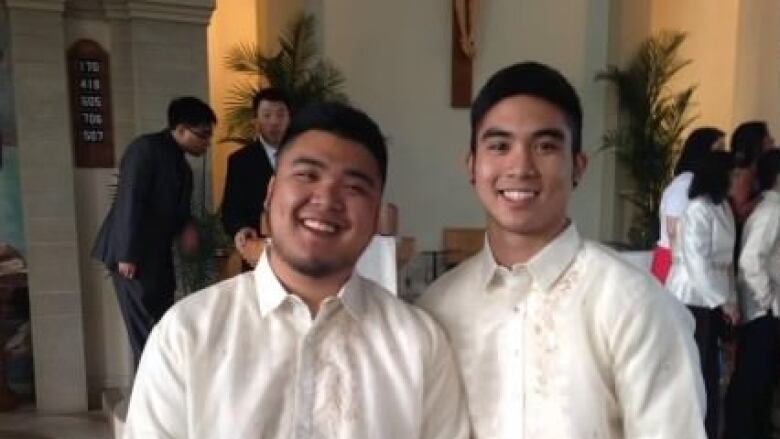My brother was my hero. I try to remember that even after his suicide
Jordan inspired me to seek help for my own struggles with mental health


WARNING: This First Person column contains details about suicide.
It is written by Patrick de Belen who is a Toronto-based storyteller and suicide survivor. For more information about CBC's First Person stories, please see the FAQ.
Jordan de Belen was a visual artist, a metal vocalist, a Muay Thai fighter, an incredible friend, my hero and my little brother. Seventeen months ago, I found him in his apartment, too late to stop his suicide. He was 26.
Celebrating the life of my hero who ended his is one of the hardest things I've had to do as a suicide survivor (a loved one who is left behind). Regardless of how much progress has been made around openly talking about mental health, it seems to never be enough to counter the perceived shame that comes with my family's loss.
I spent the past year angry and desperate to find a way to prevent my brother's final day from being more significant than the thousands of days before.
Growing up, Jordan and I used to talk all the time about suicide and our struggles with mental wellbeing. I think it was our way of trying to absolve each other of that guilt should one of us survive. The fact that we both often felt like we wanted to die, and knew that about each other, is what made us so close.

Maybe this stigma around the uncomfortable reality of suicide is what makes it hard to speak of Jordan as heroic and inspiring. Maybe that's why even with all the personal battles he lived through everyday, I can't help but think of the night he died.
Mental illness is a disease. There are genetic, environmental and social factors at play — some of which were outside of Jordan's control. And yet, in his final days, it feels like my hero let me down when he took his life. But when I can see past my hurt and confusion, I know I still consider Jordan my hero — because of how he lived.

Jordan was my hero because of how he fought back.
He was funny and disarming. His hugs made me feel vulnerable and safe all at once. He was also a master of hiding his struggles, and I was one of the few people he let in. Our family immigrated from the Philippines and lived in poverty in Canada.
But Jordan's journey was particularly challenging. He had bipolar disorder, and struggled to keep jobs and relationships.
He found different processes to channel his anger, such as sharing his pain on stage. He punched bags and pushed the limits of his body. He meditated. He was in therapy and took his medication. He worked hard to be there for the ones he loved while creating a safety net for himself too.
He was proud of being in the process of becoming better physically and mentally, and that meant more to him than being the best. He confronted his feelings of inadequacy, fear and self-hatred in the most honest way I've ever seen. He would have difficult conversations about feeling vulnerable with our Lola (grandmother) and family members of all ages, which was a challenge because mental health is generally a taboo topic for many Filipinos.

Although I will never agree with his actions on that day, I know what it's like to want to leave forever, because like him, I've wanted to since I was a kid. I have dealt with suicide ideation, depression and anxiety, and Jordan inspired me to seek professional help. It's something I'm grateful for because therapy wasn't encouraged by our other family members prior to his suicide.
A more painful truth we confronted is that Jordan's suicide brought about change in our family and led to us talking about mental health finally in the open. Today, I'm seeing family members in both the Philippines and Canada dedicate themselves to being present. They are exploring therapy, using art to heal, and sitting down with their friends to have real conversations.

I'm doing everything I can to stay too. I've written multiple poems, songs and journal entries about Jordan and released an EP of poetry dedicated to him. I am a volunteer at Bereaved Families of Ontario, and we are making a documentary involving his family and friends. My hope is that even if it helps one other person, it will be worth it. It's also our way of keeping his memory alive for his now one-year-old son. My nephew will have plenty of stories about his Pops — instead of only the story of his suicide.
And though a hero should never have to die to be appreciated, I am thankful for Jordan — for everything he's done and everything he left behind.
Patrick de Belen is a Filipino Canadian storyteller, arts educator, writer, filmmaker and spoken word poet.
If you or someone you know is struggling, here's where to get help:
-
Canada Suicide Prevention Service: 1-833-456-4566 (phone) | 45645 (text).
-
Kids Help Phone: 1-800-668-6868 (phone), live chat counselling on the website.
-
Canadian Association for Suicide Prevention: Find a 24-hour crisis centre.
-
This guide from the Centre for Addiction and Mental Health outlines how to talk about suicide with someone you're worried about.
Do you have a compelling personal story that can bring understanding or help others? We want to hear from you. Here's more info on how to pitch to us.
Originally aired June 2022